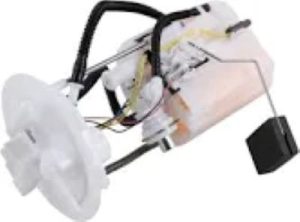The first steps to quieting a fuel pump are to ensure it is installed correctly and using components of high quality which will dampen any vibration. A Leading Cause of Fuel Pump Noise↓ is itposable imAnproper Discipline ↓ In most cases these will be in-line fuel pumps, an integral part of the vehicle's frame. The parts are designed to isolate and soak up any vibrations that might otherwise travel back through the vehicle chassis and potentially double noise levels. These isolators result into a noise of more than 70 dB from the pump during operation which can be rather loud in the cabin.
Another important method to reduce noise is to keep a fuel tank filled at full or nearly full levels. In-tank fuel pumps submerged in the gasoline require the gas to provide a buffering against sound and help cool down the pump. This is masks the noise you hear when the fuel is below a quarter tank because it doesn't have that liquid buffer, which reduces noise up to 30%! It also helps pump longevity when you can keep the tank at least half full so the pump is not overheating – which too contributes to some noise.
When fuel filters are clogged or the filter creates a restriction, the pump has to work harder because it can't pull as much fuel through the line which increases wear and increases noise. A normal vehicle pump is expected to flow 40 — 70 psiNote: Typical Vehicles but if the filter is blocked then the job of maintaining this correct rating becomes very tough on it so a fuel pressure regulator in newer cars will release some pressure in case of blockage. which means you need to change your Fuel Filter after every 30,000 – 50,000 miles at least. For high-performance setups where you may see fuel pressures exceed 90 psi, a high-flow rated filter could be necessary just to keep the noise level down. When the pump is working to push fuel through a blocked filter, the noise levels can rise up to 20%.

One of the most frequently asked question, "why does my fuel pump become louder over time?". Wear and tear, or lack of the impeller is usually to blame. This becomes problematic with lower voltages (anything less than 12.5 volts) because the pump has to work harder and starts making noise trying to compensate. Another key factor to keeping quiet operation is consistent voltage from the vehicle's electrical system delivered to the pump. By checking for voltage drops with the use of a multimeter and also correcting any wiring problems can bring the quiet operation of your pump back and eliminate that noise completely.
If you are looking to build your 3sgte for higher power, a pump like the ones that Kemso sell will best suit you but remember there is a compromise with how loud they are. With the high-flow and pressure numbers being produced from many of today's performance pumps, it is important to remember this fact: most pumps will make a lot of noise when forced into high flow or pressure operation.
If you want to find out how to reduce fuel pump noise like an expert, and learn ways to select the right quietest fuel system there is, head on over here: Fuel Pump where many different types of pumps are available that have been designed for a complete mix between performance and low noise levels.